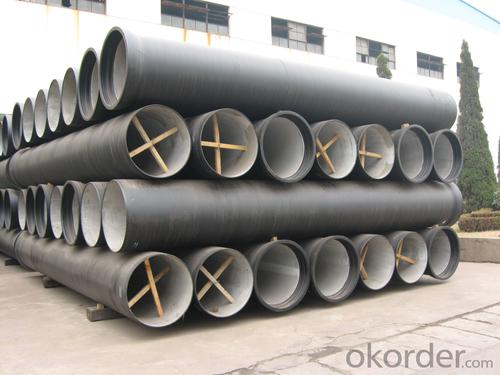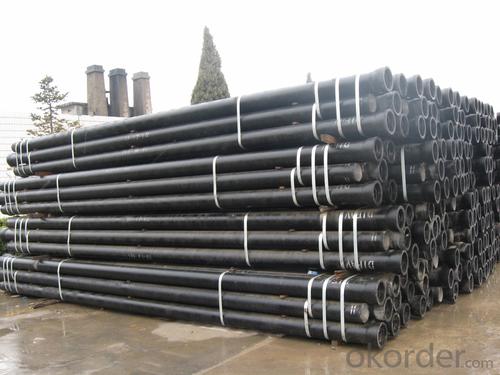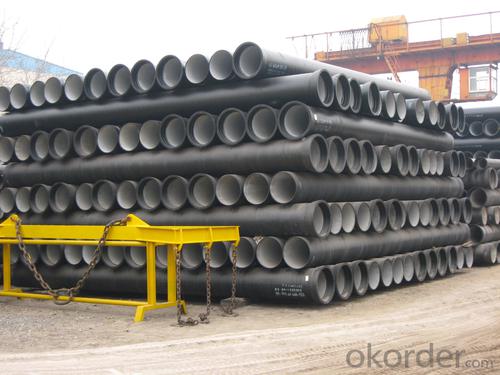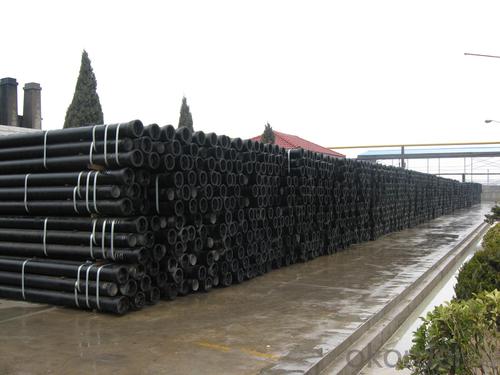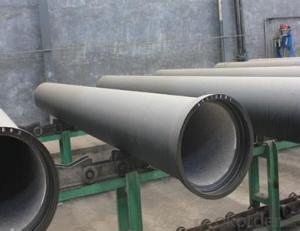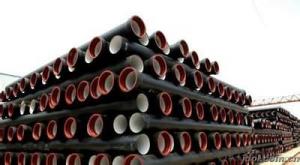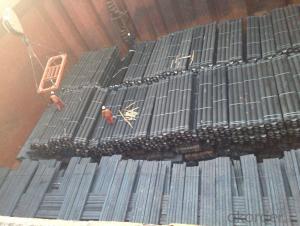DUCTILE IRON PIPE DN100 K8
- Loading Port:
- China Main Port
- Payment Terms:
- TT OR LC
- Min Order Qty:
- -
- Supply Capability:
- -
OKorder Service Pledge
OKorder Financial Service
You Might Also Like
Specification:
1) The standard of pipe: ISO2531:1998, K9
2) Effective length: 6m
3) Inner cement line: Portland cement line as per ISO4179
4) Zinc coating: at least 130g/m2 as per ISO8179
5) Bitumen painting: at least 70um as per ISO8179
6) With 100% quantity of NBR ring, or SBR ring, or EPDM ring as per ISO4633
7) DN80mm-800mm
8) High strength, lighter than grey iron, good corrosion resistance, no furring, small flow resistance, easy fixing, long life tome about 100 yeas
9) Produced by Hangzhou chunfeng machine
10) Checked by automatic inspection equipment
11) Composition:
Chemical composition | | | | |||
Chemical composition | Ductile Cast Iron Pipe (%) | Grey iron pipe (%) | Steel pipe (%) | | | |
C | 3.5-4.0 | 3.2-3.8 | 0.1-0.2 | | | |
Si | 1.9-2.6 | 1.4-2.2 | 0.15-0.4 | | | |
Mn | 0.15-0.45 | 0.4-0.6 | 0.3-0.6 | | | |
P | ≤0.06 | ≤0.3 | 0.02-0.03 | | | |
S | ≤0.02 | ≤0.1 | 0.02-0.03 | | | |
Mg | 0.03-0.06 |
|
| | | |
12) Feature:
Mechanical properties | | | | |||
| Ductile Cast Iron Pipe | Grey Iron Pipe | Steel Pipe | | | |
Tensile Strength(Mpa) | ≥420 | 150-260 | ≥400 | | | |
Yield Strength(Mpa) | ≥300 | No Confirmation | No Confirmation | | | |
Bending Strength(Mpa) | ≥590 | 200-360 | ≥400 | | | |
Elongation (%) | ≥10 | Neglected | ≥18 | | | |
Brinell Hardness(HBS) | ≤230 | ≤230 | About 140 | | | |
13) T type mechanical joint
14) Packing: in bulk or container
- Q: Can ductile iron pipes be used for underground fire hydrant systems?
- Yes, ductile iron pipes can be used for underground fire hydrant systems. Ductile iron pipes are known for their strength, durability, and resistance to corrosion, making them a suitable choice for underground installations. They can withstand the high pressure and flow rates required for fire hydrant systems, ensuring reliable water supply for firefighting purposes.
- Q: Can ductile iron pipes be used for water distribution networks in rural areas?
- Yes, ductile iron pipes can be used for water distribution networks in rural areas. Ductile iron pipes are known for their high strength and durability, making them suitable for various applications, including water distribution. They have excellent resistance to external loads and pressure, making them ideal for underground installations. In rural areas where the water distribution network may be subjected to harsh environmental conditions or agricultural activities, ductile iron pipes can withstand external forces and resist corrosion better than other materials. They are also less prone to cracking or leaking, ensuring a reliable water supply for rural communities. Moreover, ductile iron pipes have a long service life, often exceeding 100 years. This makes them a cost-effective choice for rural water distribution networks, as they require minimal maintenance and replacement over time. However, it is important to consider other factors such as the availability of ductile iron pipes in the area, the cost of installation, and the technical expertise required for their installation and maintenance. Additionally, local regulations and standards should be followed to ensure compliance and safety. Overall, ductile iron pipes can be a suitable and reliable option for water distribution networks in rural areas, providing a long-lasting and efficient solution for delivering clean water to communities.
- Q: How does ductile iron pipe perform in high-temperature steam applications?
- Ductile iron pipe performs quite well in high-temperature steam applications. Ductile iron is a strong and durable material, known for its ability to withstand high pressures and temperatures. When exposed to high-temperature steam, ductile iron pipes maintain their structural integrity and do not deform or crack easily. They have a high resistance to thermal expansion and contraction, making them suitable for applications where temperature variations are common. Additionally, ductile iron pipes have excellent corrosion resistance, which is especially important in steam applications where the presence of moisture can lead to accelerated corrosion. Overall, ductile iron pipes are a reliable choice for high-temperature steam applications, providing long-lasting performance and ensuring the safe and efficient transportation of steam.
- Q: How are ductile iron pipes protected against freeze-thaw cycles?
- Ductile iron pipes are protected against freeze-thaw cycles by using a combination of insulation, proper installation techniques, and the addition of corrosion inhibitors or anti-freeze agents in the water supply. This helps prevent the expansion and contraction of the pipes caused by freezing and thawing, reducing the risk of damage or cracking.
- Q: Can ductile iron pipes be used in areas with high levels of hydrogen sulfide gas?
- Ductile iron pipes can generally be used in areas with high levels of hydrogen sulfide gas, but it is important to consider certain factors before making a decision. Hydrogen sulfide gas is corrosive and can potentially cause damage to metal pipes over time. While ductile iron is known for its durability and corrosion resistance, prolonged exposure to high levels of hydrogen sulfide gas can still lead to corrosion and deterioration. To mitigate the risks associated with hydrogen sulfide gas, it is advisable to assess the specific conditions of the area beforehand. This includes conducting a comprehensive analysis of the hydrogen sulfide gas concentration, pH levels, temperature, and other factors that may influence corrosion. Consulting with experts or engineering professionals who specialize in corrosion control can provide valuable insights and guidance. In some cases, additional measures may be necessary to protect ductile iron pipes. Coating the interior and exterior surfaces of the pipes with protective materials, such as epoxy or polyethylene, can provide an extra layer of defense against corrosion. Alternatively, cathodic protection systems can be employed to protect the pipes by applying a low voltage electrical current that mitigates the corrosion process. Ultimately, the decision to use ductile iron pipes in areas with high levels of hydrogen sulfide gas should be based on a thorough understanding of the specific conditions and implementing appropriate corrosion prevention measures. Regular monitoring and maintenance should also be conducted to ensure the pipes are functioning optimally and to address any potential issues before they escalate.
- Q: Are ductile iron pipes suitable for hydroelectric power plants?
- Indeed, hydroelectric power plants can benefit from the suitability of ductile iron pipes. Renowned for their robustness, endurance, and adaptability, ductile iron pipes prove to be an optimal selection for a variety of water industry applications, including hydroelectric power plants. These pipes exhibit the ability to endure substantial pressure and resist corrosion, thereby ensuring their appropriateness for the conveyance of water throughout the various stages of hydroelectric power generation. Moreover, the extended lifespan of ductile iron pipes and their minimal maintenance requirements effectively reduce the overall operational expenses associated with power plant maintenance. Consequently, ductile iron pipes emerge as a dependable and fitting choice for hydroelectric power plants.
- Q: General cast iron prices now
- Hello friends, Tianjin is in Shandong Qingdao 6500 7300 yuan / ton to 7100 yuan a ton of Zhejiang 7500 to 9000 yuan a ton, this is a great relationship, and the production of raw materials, for reference only, we are ductile casting manufacturers, the information can not say 100% accurate but can reference.
- Q: Are ductile iron pipes available for cutting and are there any relevant specifications?
- Ductile iron pipes can be divided into cutting and non cutting pipes, the cutting pipe can be cut, and the cutting pipe is usually marked with "scissors" mark in the pipeline.
- Q: Are ductile iron pipes suitable for use in cooling water systems?
- Yes, ductile iron pipes are suitable for use in cooling water systems. Ductile iron pipes have excellent strength and durability, making them resistant to the high-pressure and corrosive nature of cooling water systems. They can withstand the extreme temperature variations and provide long-lasting performance. Additionally, ductile iron pipes have good resistance to the growth of microorganisms, which is important in maintaining the quality of the cooling water. Moreover, ductile iron pipes offer ease of installation and have a low maintenance requirement, making them a cost-effective choice for cooling water systems. Overall, ductile iron pipes are a reliable and suitable option for use in cooling water systems.
- Q: Are ductile iron pipes suitable for installation in areas with high soil settlement and consolidation?
- Ductile iron pipes are commonly used in areas where there is significant soil settlement and consolidation. One of the main advantages of these pipes is their ability to withstand external loads and accommodate ground movement. Compared to other pipe materials, ductile iron pipes are known for their strength and flexibility, making them more resistant to soil settlement and consolidation. They have a higher tensile strength and can withstand heavy loads and ground vibrations without cracking or breaking. This makes them suitable for areas with soil prone to settlement and consolidation. Moreover, ductile iron pipes have a high resistance to corrosion and can withstand aggressive soil conditions, which are often found in areas prone to settlement and consolidation. They are also less likely to be damaged by external factors such as roots or rocks, making them even more suitable for installation in such areas. However, it is important to consider the specific conditions of the site and consult with engineers or experts who are familiar with the local soil conditions. Factors such as the magnitude and rate of settlement, soil type, groundwater levels, and construction methods should be taken into account when determining whether ductile iron pipes are appropriate for installation in areas with high soil settlement and consolidation. In conclusion, ductile iron pipes are generally a suitable choice for installation in areas with high soil settlement and consolidation. Their strength, flexibility, resistance to corrosion, and ability to withstand external loads make them a reliable option for these conditions. Nevertheless, it is always recommended to assess the specific site conditions and consult with professionals to ensure the most appropriate pipe material is selected for each project.
Send your message to us
DUCTILE IRON PIPE DN100 K8
- Loading Port:
- China Main Port
- Payment Terms:
- TT OR LC
- Min Order Qty:
- -
- Supply Capability:
- -
OKorder Service Pledge
OKorder Financial Service
Similar products
Hot products
Hot Searches
Related keywords




